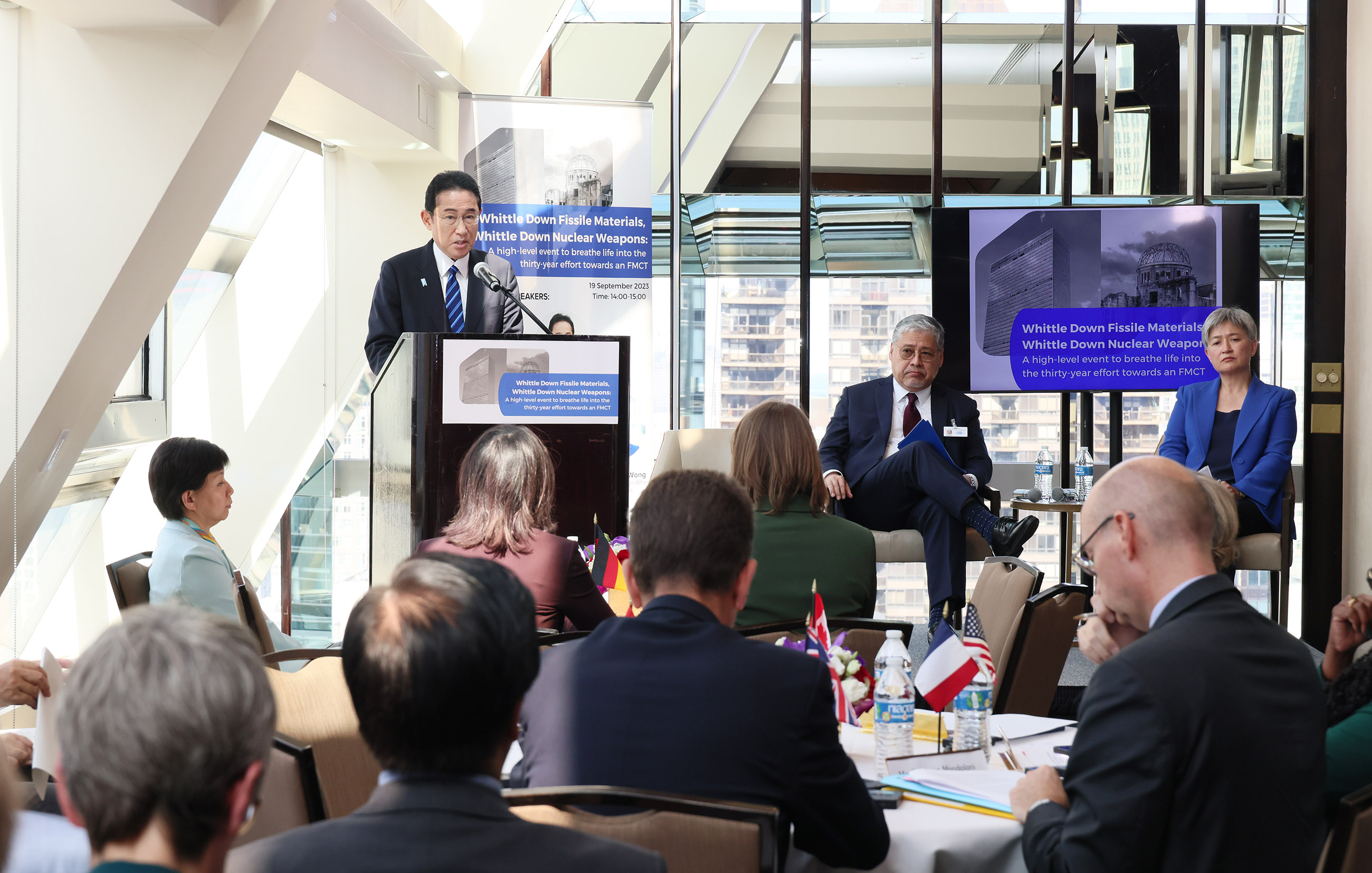Prime Minister Kishida’s Attendance at the Commemorative High-Level Event on a Fissile Material Cut-Off Treaty (FMCT) (Summary)
[Provisional translation]
During his visit to New York to attend the United Nations General Assembly, Mr. KISHIDA Fumio, Prime Minister of Japan hosted the Commemorative High-Level Event on a Fissile Material Cut-Off Treaty (FMCT) entitled “Whittle Down Fissile Materials, Whittle Down Nuclear Weapons” on September 19, from 2:00 p.m. local time (3:00 a.m., September 20, Japan time) for approximately one hour and twenty minutes. The summary of the event is as follows.
Japan places high priority on an FMCT as one of realistic and practical efforts towards realizing a world without nuclear weapons. From this standpoint, the “G7 Leaders’ Hiroshima Vision on Nuclear Disarmament” issued in May at the G7 Hiroshima Summit, urged all countries to refocus political attention towards the FMCT on the occasion of this year that marks the 30th anniversary of the adoption of the United Nations General Assembly resolution calling for an FMCT. This commemorative event was organized as Japan’s own contribution to this call to refocus political attention towards the FMCT and was co-hosted by Japan, the Philippines and Australia.
- At the outset, Prime Minister Kishida gave a keynote speech. The Prime Minister stated that the current severe international situations, including Russia’s aggression against Ukraine and its threats to use nuclear weapons, as well as the division besetting the international community over nuclear disarmament, have only made the goal of achieving a world without nuclear weapons further remote. The Prime Minister then pointed out that, for the first time since the peak of the Cold War, the world is on the cusp of a reversal of the decreasing trend of the global number of nuclear arsenals, making it is even more necessary to start early negotiations on an FMCT, which limits the quantitative improvement of nuclear weapons by banning the production of fissile material for nuclear weapons. In addition, referring to the “Hiroshima Action Plan” announced at the NPT Review Conference in August last year and the “G7 Leaders’ Hiroshima Vision on Nuclear Disarmament” issued at the G7 Hiroshima Summit in May this year, Prime Minister Kishida stated that he is convinced that refocusing political attention towards an FMCT through this event will reinvigorate discussions and provide an opportunity to work toward an early commencement of negotiations, which will lead to the revitalization and strengthening of the NPT regime.
- Subsequently, with Minister for Foreign Affairs of Australia Penny Wong serving as moderator, Secretary for Foreign Affairs of the Philippines Enrique Manalo, United Nations Under-Secretary-General and High Representative for Disarmament Affairs Nakamitsu Izumi, President of the Republic Palau Surangel S. Whipps, Federal Minister for Foreign Affairs of Germany Annalena Baerbock, Minister of Foreign Affairs of the Netherlands Hanke Bruins Slot, Minister of Foreign Affairs of the Arab Republic of Egypt Sameh Shoukry, Deputy Minister of Foreign Affairs and International Cooperation of Italy Edmondo Cirielli, and other ministerial-level participants made their interventions. Both nuclear-weapon States and non-nuclear weapon states expressed their commitment to the early commencement on the negotiations on a FMCT and stressed its importance. Many speakers stressed that the FMCT is an essential disarmament measure to achieve a "world without nuclear weapons", that we should not think it is impossible to commence negotiations on such a treaty, that what is needed is political will, and that the FMCT should be pursued in order to build confidence among nations. It was also pointed out that those nations that have not yet done so should be asked to declare a voluntary moratorium on the fissile material production for nuclear weapons.
- The event continued until 3:20 p.m., during which participants from various countries actively exchanged views.
[Reference] Fissile Material Cut-Off Treaty (FMCT)
FMCT is a treaty aimed at prohibiting the production of fissile materials (highly enriched uranium, plutonium, etc.), which can be used as raw materials for nuclear weapons, and is expected to help prevent any further increase in the number of nuclear weapons. In 1993, the then US President Clinton proposed negotiations for such a treaty, which however, not yet begun. Japan attaches importance to the early start of FMCT negotiations.
